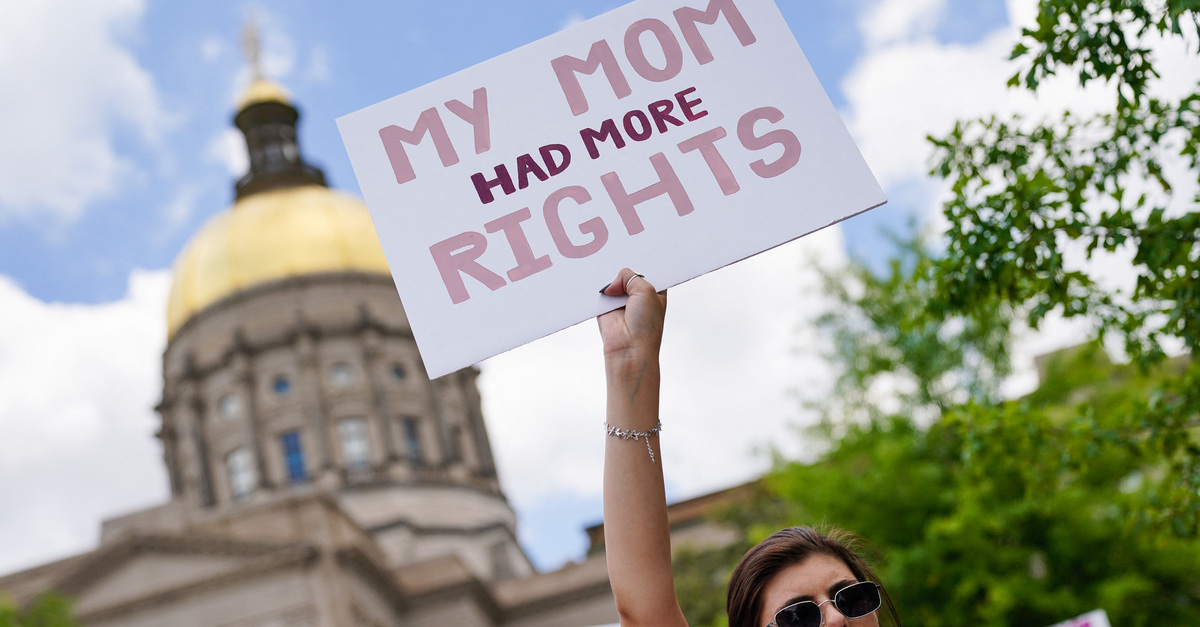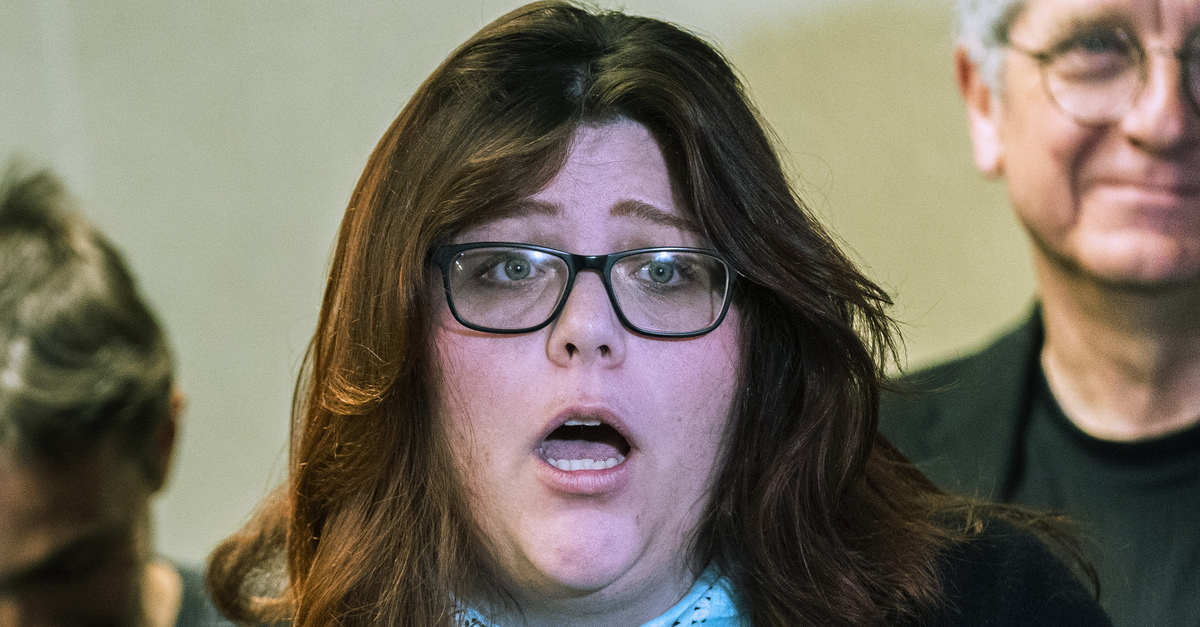
Activists rally outside the State Capitol in support of abortion rights in Atlanta, Georgia on May 14, 2022. – Thousands of activists are participating in a national day of action calling for safe and legal access to abortion. The nationwide demonstrations are a response to leaked draft opinion showing the US Supreme Court’s conservative majority is considering overturning Roe v. Wade, the 1973 ruling guaranteeing abortion access. (Photo by Elijah Nouvelage / AFP) (Photo by ELIJAH NOUVELAGE/AFP via Getty Images)
A federal judge in Washington, D.C., suggested that courts may have been misinterpreting the Supreme Court’s bombshell decision in Dobbs v. Jackson Women’s Health Organization — and questioned whether there still may be a Constitutional right to abortion.
U.S. District Court Judge Colleen Kollar-Kotelly, a Bill Clinton appointee, ruled Monday that the criminal case against an anti-abortion activist could potentially be a vehicle for examining whether there could be a new legal basis for the right to abortion now that the Supreme Court has dismantled the framework in use since Roe v. Wade.
The criminal case involves Lauren Handy, an anti-abortion activist who was indicted after police found five fetuses in her home, and after she bragged about having dozens more.
Handy was prosecuted in March 2021 for allegedly leading an attack on an abortion clinic, storming the facility, knocking over an employee, and blocking people from entering the facility. If convicted, Handy faces up to 11 years in prison and a $350,000 fine. She has pleaded not guilty.
Among the charges against Handy is conspiracy against rights, under 18 U.S. Code § 241.
The federal statute at issue requires (emphasis ours):
If two or more persons conspire to injure, oppress, threaten, or intimidate any person in any State, Territory, Commonwealth, Possession, or District in the free exercise or enjoyment of any right or privilege secured to him by the Constitution or laws of the United States, or because of his having so exercised the same.
As part of Handy’s defense, counsel argued on her behalf that she could not possibly be guilty under §241, because there is no “right” to an abortion against which she could have been conspiring.
Handy’s lawyers argued that the Supreme Court’s ruling in Dobbs is “fatal to the conspiracy charge” against their client. While Handy’s alleged actions occurred before the high court ruled in Dobbs, her attorneys say the timing is not relevant.
“The Dobbs court did not indicate that there is no longer a constitutional right to abortion; the court has made clear there never was,” they argued in their motion to dismiss.
Judge Kollar-Kotelly, however, was unwilling to confine her legal analysis to the Dobbs holding and wrote that Handy’s constitutional argument was “predicated on [a] false legal premise.”
For starters, wrote the judge, the statute does not just refer to the right to an abortion. Rather, rights to other things such as counseling, referrals, and other health services could be at issue.
While that aspect of the analysis relates principally to the charges against Handy, the judge’s further analysis has the potential for a far broader effect. Kollar-Kotelly wrote that while Dobbs is often misread to wipe out any constitutional right to abortion, its actual import is narrower.
The judge explained that the Dobbs case — like every case before every court — only has a binding effect on the issues directly related to the case at hand. Kollar-Kotelly continued and discussed the difference between a case’s holding (that which is necessary to the outcome and therefore binding), and non-binding dicta.
Dobbs asked whether the Fourteenth Amendment’s application of First Amendment rights provided the right to an abortion, but it did not ask whether the right to an abortion might be protected by some other part of the Constitution. Indeed, the Dobbs court upended Roe and found that whatever right to privacy may be protected by the First Amendment does not include any right to an abortion. However, Dobbs confined its analysis there and zeroed in on the key tenets of Roe.
The judge in Handy’s case was unwilling to accept Dobbs as a blanket statement on the right to abortions generally, and wrote, “it is entirely possible that the Court might have held in Dobbs that some other provision of the Constitution provided a right to access reproductive services had that issue been raised.”
Kollar-Kotelly suggested that perhaps the Thirteenth Amendment might be one place to look for a Constitutional right to abortion. The Thirteenth Amendment, ratified in 1865, abolished slavery, while the Fourteenth Amendment is the vehicle by which other Constitutional rights are extended to all individuals.
The judge ordered the parties to make their arguments in briefs due by March 3 and March 17.
Law&Crime spoke with Andrew Koppelman, John Paul Stevens Professor of Law at Northwestern University, on Tuesday, who said that while a right to abortion grounded in the Thirteenth Amendment is a “marginal” argument that “people may not take seriously” at present, the same could once have been said about a constitutional right to same-sex marriage or gun possession.
Koppelman said that such arguments gain traction legally as they receive more attention in public discourse. He noted that while some people are “surprised” by Kollar-Kotelly’s ruling, the District Court acted “quite properly” in ordering the parties to brief the Thirteenth Amendment aspect of their arguments.
Like the judge, Koppelman pointed out that when the Supreme Court decided Dobbs, it addressed solely a due process analysis, but left other potential analyses on the table.
The conservative Supreme Court’s eradication of abortion rights under Dobbs has been widely criticized, both by the Court’s own justices and by countless others.
Kollar-Kotelly’s suggestion that the right to an abortion might be resurrected by creative theorizing outside the ambit of First-Amendment privacy is not a particularly novel idea; many times in American legal history, the legal right to freedoms has been grounded in more than just one origin point. However, given the contentiousness of the abortion debate both before and after Dobbs, any new approach to abortion rights is almost certain to be stalled by the shadow of Dobbs and a Supreme Court majority that promises to be hostile to abortion.

Anti-abortion activist Lauren Handy speaks during a news conference after police found five fetuses in her home. Handy faces federal charges for blocking access to a reproductive health center.
Still, the Handy case is an interesting application of abortion jurisprudence in a case that is not primarily about abortion. At issue is not a party’s right to have an abortion, but rather, a criminal defendant’s interference with the civil rights of an alleged victim. The case’s potential to become a mechanism for expanded abortion rights under novel legal theories is likely one that Handy herself never expected.
Koppelman acknowledged that the current Supreme Court would be unlikely to find a constitutional right to abortion within the Thirteenth Amendment, but said that the long-term future for such an argument is not as clear, because there are simply ” too many unknowables” in play. Koppelman analogized the uncertainty of abortion rights under the Thirteenth Amendment to the future of war in Ukraine: “As with the war in Ukraine, you have to decide which side you’re on and wait to see what happens.”
Elura Nanos is a former civil prosecutor for NYC’s Administration for Children’s Services and trial analyst for Law & Crime
[image via AP/Manuel Balce Ceneta]